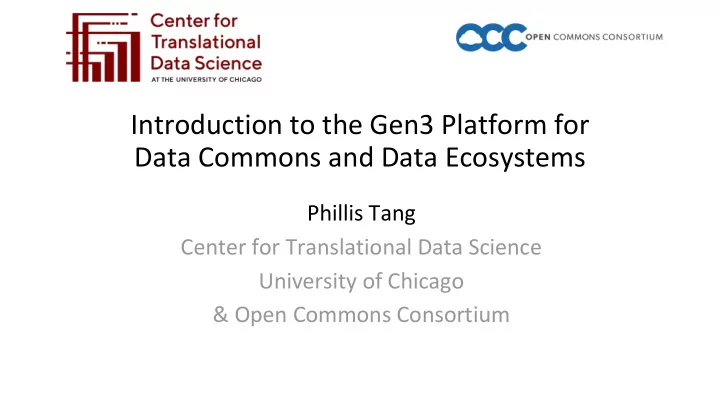

Introduction to the Gen3 Platform for Data Commons and Data Ecosystems Phillis Tang Center for Translational Data Science University of Chicago & Open Commons Consortium
Data Commons Data organize the data for a Warehouses scientific discipline, community , or field and are enabled by Data warehouses large scale cloud organize the data for computing. an organization (and are enabled by enterprise computing) Databases organize the data around a project .
Multi-Discipline Discipline (Virtual) Organization Data Ecosystems Data Commons 2018 - 2028 Project 2014 - 2024 Data Clouds • Interoperates multiple • Supports large data 2010 - 2020 data commons, • Workspaces databases, knowledge • • Supports large data & Common data models bases , and other • data intensive computing Databases Core data services resources • with cloud computing Data & Commons 1982 - present • Supports ecosystem of • Researchers can analyze Governance commons, portals, • Data repository • data with collaborative Harmonized data notebooks, applications & • Data catalogs • tools ( workspaces ) – so Data sharing simulations across • Download data • data does not have to be Reproducible research multiple disciplines downloaded)
Genomic Data Commons - data exploration
AW AWS S3 S bucket with Gen3 Secure Environment data Authorization Log Database security Google Gen3 Stack events bucket with Graph Data data Database On-Prem Controlled ingress from outside bucket with data Authentication via Presigned urls to Single Sign On (SSO) directly access buckets Users for raw data
Data Access Control • Bucket policy prevents access by unauthorized users Cloud Bucket With Data • Data access is logged for auditing and compliance • Gen3 Auth(Fence) provides Authentication and Authorization, and Data Access. Gen3 Auth • Gen3 Auth works with multiple identify providers (IdP) including Google, and easily adaptable for any support OIDC provider • This enables Single Sign On (SSO) compatibility with most systems • Authorization for data access via internal Access Control List specified by the stakeholders
Data Access Control • Gen3 auth has a Role Based Access Control (RBAC) engine Gen3 Auth The RBAC engine understands the hierarchical nature of a users permissions, and can be used to determine if the user has access to a specific piece of data Program Alpha Project Adam Project Baker Project Charlie Authorization for a user would then be stored as: Case Zulu Case Mike rgrossman1@uchicago.edu: resources: Sample 1 Sample 1 - resource: /programs/alpha/projects/baker privilege: [create, read, read-storage, write-storage] - resource: /programs/alpha/projects/adam/cases/zulu privilege: [read, read-storage] Giving write (submission) access to the Baker project and all nodes underneath it, while read access to only the Zulu case in the Adam project
Data Access Control ● Query gateway provides the potential to limit the queries that users can perform and control when Query Gateway results are returned. Examples of queries: Query1: StandardDeviation(variable) where STUDENTS_GENDER is MALE Blue = querying user can specify Results returned only when # of students represented in the query > a threshold. I.e. only return standard deviations when the query is computing it for at least 10 students.
Jupyter Notebooks • Jupyter Notebooks are powerful tools for creating custom analysis over datasets Jupyter • Gen3 runs Jupyter Notebooks in a secure cloud environment helping to reduce the need to download data to laptops, etc.
Data Ontologies Dictionary viewer • Gen3 dictionary viewer allows browsing data vocabularies within a particular data commons
Data Ontologies • Ontologies contain controlled vocabulary developed by a PFB standards body. • Data dictionaries contain references to the ontology terms allowing harmonization of differing data dictionaries
Data Aggregation
Data & User Flow with Gen3
Recommend
More recommend